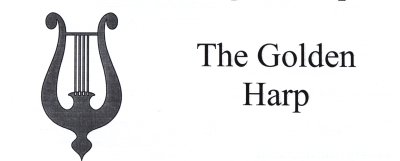Return to Gwyneth Walker Music Catalog
Read a review of The Golden Harp (1999) for SATB chorus and string quartet by Christopher Hyde, Maine Classical Beat.
Download an MP3 file of the complete work (including the poetry readings) performed by the Arkansas Chamber Singers (John Yarrington, conductor) and the Quapaw String Quartet, Little Rock, Arkansas.
Download an MP3 file of the first movement of this work performed by Madrigalia (Roger Wilhelm, director) and Quartsemble, Rochester, New York
Download an MP3 file of the second movement of this work.
Download an MP3 file of the third movement of this work.
Download an MP3 file of the fourth movement of this work.
Download an MP3 file of the fifth movement of this work.
Download an MP3 file of the sixth movement of this work.
Download an MP3 file of the seventh movement of this work.
Download an MP3 file of the eighth movement of this work.
Download an MP3 file of the first movement of this work performed by the Brown University Chorus, Frederick Jodry, director
Download an MP3 file of the second movement of this work.
Download an MP3 file of the third movement of this work.
Download an MP3 file of the fourth movement of this work.
Download an MP3 file of the fifth movement of this work.
Download an MP3 file of the sixth movement of this work.
Download an MP3 file of the seventh movement of this work.
Download an MP3 file of the eighth movement of this work.
Download an MP3 file of the first movement of this work (string orchestra version) performed by Buffalo (New York) Unitarian Universalist Church Choir and Orchestra, Barbara Wagner, director.
Download an MP3 file of the second movement of this work.
Download an MP3 file of the third movement of this work.
Download an MP3 file of the fourth movement of this work.
Download an MP3 file of the fifth movement of this work.
Download an MP3 file of the sixth movement of this work.
Download an MP3 file of the seventh movement of this work.
Download an MP3 file of the eighth movement of this work.
Download a PDF file of the choral score of this composition. For perusal only -- not printable.
Download a PDF file of the full score (string quartet version) of this composition. For perusal only -- not printable.
Download a PDF file of the full score (string orchestra version) of this composition. For perusal only -- not printable.
Download a PDF file of the score of "Two Prayers". For perusal only -- not printable.

The Golden Harp is the result of a commission from the Arkansas Chamber Singers for a work for chorus and string quartet. The Chamber Singers wished to collaborate with the Quapaw Quartet (string quartet from the Arkansas Symphony) in presenting music written especially for the two ensembles.
The poetry of Rabindranath Tagore was suggested to the composer by a member of the Arkansas Chamber Singers. And indeed this poetry is well-suited to settings for chorus and strings. The poems are gentle and lyrical. The language is readily comprehensible and very singable. There are frequent images of floating and soaring -- images congenial to the string idiom, as the bows float across the strings, or musical lines soar into the high ranges of the instruments.
The opening song, "I Am Here to Sing Thee Songs," contains the phrase "When in the morning air the golden harp is tuned." This beautiful image of a stringed instrument captured the composer's imagination, and led to the title of the work.
All of the poetry selected for The Golden Harp is found in Tagore's collection, Gitanjali, published in 1913. The poems span the course of the poet's life. And the form of The Golden Harp mirrors this pattern. The work is divided into seven sections: triumphant at the beginning and close (#1 "Invocation" and #7 "Salutation"); more introspective in the interior sections (#2 "Beloved," #3 "Prayer," #5 "Thou Art" and #6 "My Tears of Sorrow"); and rising to a celebratory middle section (#4 "Light, My Light").
The message of The Golden Harp is spiritual, and yet very close to the center of human emotions. Tagore's poetry extols the beauty of the divine and the beauty of the soul within -- the beloved as creator, the beloved as lover. "Thou art the sky and thou art the nest as well."
Born in 1861 to an influential Bengali family, Rabindranath Tagore achieved fame as a novelist, playwright, poet, painter, lecturer, politician and composer. In 1913 he was awarded the Nobel Prize in literature, the first non-European to achieve such an honor. He died in 1941.
Notes by the composer